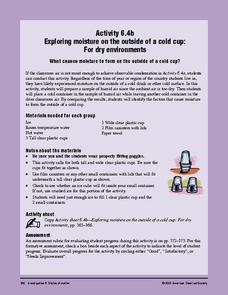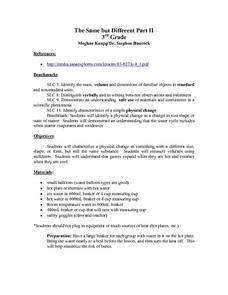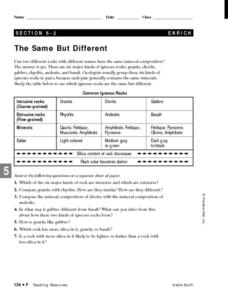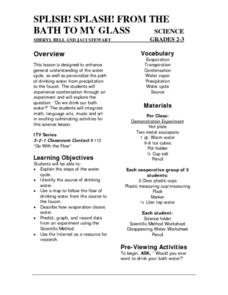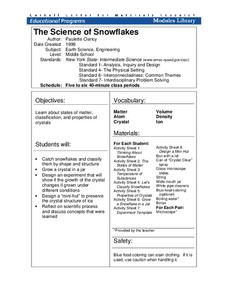American Chemical Society
Condensation
It's time to break the ice! If you are doing all of the lessons in the unit, children have already seen that increasing heat increases the rate of evaporation, but is the opposite true? Does decreasing temperature cause more condensation...
American Chemical Society
Changing State: Condensation
When you have a cold drink and you notice the water forming on the outside, it is literally pulling the water from the surrounding air to form the condensation. After watching a demonstration of condensation forming on a glass,...
American Chemical Society
Exploring Moisture on the Outside of a Cold Cup: For Dry Environments
If the area you live in is arid, or the preceding experiment in this unit didn't yield obvious results, use this one in place of it to help reveal where condensation comes from. The mini unit that this is part of a comprehensive...
American Chemical Society
Exploring Moisture on the Outside of a Cold Cup
As a stand-alone or as part of the intended unit, this is a valid investigation of what causes condensation to occur. By limiting the amount of air around a cold cup of water and comparing it to one out in the open, they find that the...
NOAA
The Cycle of Water
Help young scientists get to the bottom of the water cycle with this comprehensive earth science lesson. After first viewing and discussing presentations about the states of water and the water cycle, the class performs a series of...
Signing Time Foundation
What is the Water Cycle?
Dive into an exploration of the water cycle cycle with this simple earth science lesson. After first discussing where rain comes from, young scientists define the terms condensation, evaporation, transpiration, and precipitation as a...
National Wildlife Federation
The Water Cycle
Observe the water cycle from the comfort of your classroom with this excellent earth science experiment. Working collaboratively, young scientists first create terrariums complete with hills, plants, lakes, and an atmosphere,...
Curated OER
The Same, But Different Part II
Learners characterize a physical change as something that changes to a different size, but retains its basic substance. They measure volumes using milliliters, and perform an experiment that proves that gases expand when hot and contract...
Curated OER
The Same, But Different
Third graders examine the phase change between solids and liquids and determine it to be a physical change. Ice is the perfect item to use to demonstrate this phase change. Pupils experiment with measuring and weighing solid ice and the...
Royal Society of Chemistry
A Reversible Reaction of Hydrated Copper (II) Sulfate
How can removing water change the color of a substance? Lab partners remove the water of crystallization from hydrated copper (II) sulfate, record their observations, then rehydrate the solid. The resource is printable and contains ideas...
Curated OER
Physical Changes and States of Matter
Fourth graders identify a physical change as one that results in a change in size, shape, or state of matter. After an initial teacher-led discussion and demonstration, groups of students get together to perform an experiment which...
Center for Learning in Action
Water—Changing States (Part 1)
Here is part one of a two-part lesson in which scholars investigate the changing states of water—liquid, solid, and gas. With grand conversation and up to three demonstrations, learners make predictions about what they think will happen...
Center for Learning in Action
Water – Changing States (Part 2)
Here is part two of a two-part instructional activity in which scholars investigate the changing states of water—liquid, solid, and gas—and how energy from heat changes its molecules. With grand conversation, two demonstrations, and one...
Curated OER
Splish! Splash! From the Bath to my Glass
An excellent lesson on the water cycle! In it, learners should gain a general understanding of the water cycle, along with how water first falls as precipitation, then ends up coming out of our faucets. This lesson nicely integrates...
Calvin Crest Outdoor School
Survival
Equip young campers with important survival knowledge with a set of engaging lessons. Teammates work together to complete three outdoor activities, which include building a shelter, starting a campfire, and finding directions in the...
Cornell University
The Science of Snowflakes
Who can grow the best crystals? Challenge class members to develop strategies for enhancing growth in the crystals. Through a lab investigation, learners study the properties of crystals and test the effectiveness of different growth...
North Carolina Consortium for Middle East Studies
Missing Pieces of the Puzzle: African Americans in Revolutionary Times
What's missing from most studies of the American Revolutionary War is information about the role African Americans played in the conflict. To correct this oversight, middle schoolers research groups like the Black Loyalists and Black...




